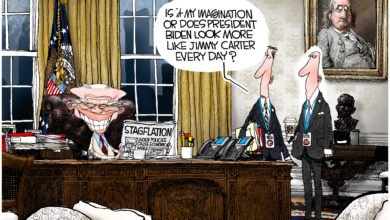If Andrew Jackson Were Alive Today, He Would Shoot The Democrats, Run The Republicans Through, and Join The Tea Party!
When Americans hear the name Andrew Jackson, many believe white-washed historical myths claiming Jackson was nothing more than a racist Indian killer. Never mind warring Indian tribes were massacring friendly tribes long before settlers landed on America’s shores, and forget warring tribes were paid by the French and Spanish to kill friendly tribes and settlers, it makes Americans appear less racist to professional race hustlers, government-indoctrinated history buffs, and politically faux Indians when Americans despise the white anti-Federalist General, ordered by the Federal Government to the frontier to stop both sides–white and Indian– from killing each other.
Jackson’s personality, which displayed a temper and fowl vocabulary, was considered indelicate for a Southern gentleman and Washington society. It’s still causes political wimps in both parties to be overcome with the vapors.
Jackson’s outspoken personality is more in line with modern-day conservatives than Jackson’s own Democrat Party that still lacks manliness.
Daniel Howe, author of Making The American Self writes that Jackson was not the kind of politician who looked at public opinion to guide his policies: “Jackson knew what he wanted to do, and did it, and then tried to enlist public opinion in support of what it was he did.”
And like Tea Party conservatives, Jackson was despised by Washington elites and his party’s opponents. But the people were on Jackson’s side, because holding the union together and upholding the Constitution was Jackson’s goal.
Outspokenness was the reason Jackson didn’t remain in either House: Leaders behaved like children: Constant squabbling over bills without an up or down vote. Jackson, who demanded leaders vote or duel until someone wins, became disgusted with the slow process on behalf of the country’s leadership that left Americans hanging in the balance waiting for laws to be passed or rejected.
If only we had real men on the House floor telling politicians what they could do to themselves! Unfortunately, some leaders have a habit of doing just that to themselves…and sharing it on the internet!
Jackson said of the government:
I weep for the liberty of my country when I see at this early day of its successful experiment that corruption has been imputed to many members of the House of Representatives, and the rights of the people have been bartered for promises of office.
If Jackson were alive today, he would duel Harry Reid and John Boehner, and hurl a bucket of water on Nancy Pelosi… just to see if the rumor is true!
Jackson would no doubt join the Tea Party and tell conservatives: “If the GOP refuses to return to its conservative roots, drown the GOP in Conservative Tea!”
The anti-Federalist Jackson demanded limited government, and like today’s conservatives, Jackson believed all “corruption, fraud, and lies dwelt inside the White House,” causing Jackson to “fear” for his country. Jackson said Americans were being duped by a government “prevent[ing] the poor and humble from the tyranny of wealth and power.”
Government elites then wanted all the wealth and control, but the people kept poor. Reelecting the powerful, but kept poor. Sound familiar?
Because Jackson believed “the President is the direct representative of the American people,” the president must protect the people’s interests. The first goal as president: Destroy Hamilton’s Second Bank and pay off America’s national debt.
Yes: America once had a president who paid off the national debt!
The Central Bank overprinted paper while the government sent America’s gold to Europe. The nation was bankrupt and cheap paper backed paper. Jackson wanted the people in control of their property, not government, all bank deposits must be removed from the government, and gold, Jackson believed, was the best way to keep currency at values.
This is echoed by conservatives today:
Bloomberg News reporter Joshua Zumbrun wrote in 2010 that:
A majority of Americans are dissatisfied with the nation’s independent central bank, saying the U.S. Federal Reserve should either be brought under tighter political control or abolished outright.
In 1832 Jackson demanded the national debt be paid down by fifty percent. He despised the way central banking handled deposits: It was corrupt and America’s deposits unsafe. Jackson demanded:
[A]n investigation [into the BUS’s actions] kills it and its supporters dead. Let this be had—call upon the sec’ of the Treasury who must agree with me than an investigation by Congress is absolutely necessary.” (Robert v. Remini Andrew Jackson and the Course of American Democracy: 1833-1845 (New York: Harper 7 Row, Publishers, 1984), 52.)
Jackson destroyed Hamilton’s Federal Reserve-style Central Bank, but, as H. W. Brands notes in his book Andrew Jackson: His Life and Times: “Andrew Jackson contributed nothing toward the charter of the new bank or the passage of the protective tariff, though the bank and the tariff would figure centrally into his career” before he became president and destroyed the Central Bank.
Robert V. Remini writes in Jackson and the Bank War: When removing one system, something must replace it in order to prevent corruption. Remini says Jackson refused to set up a bulwark-style bank to replace Hamilton’s Second Bank and protect the people’s investments from the government, because Jackson never wanted a substitute for the Central Bank unless his belief, that state banks worked better the U.S. Treasury, failed.
Jackson promised the American people he would never replace the Central Bank with another government-controlled monster unless the replacement was to his liking, not Washington bureaucrats seeking to control the people’s money.
I don’t think Jackson would be delighted to see his face on a $20 dollar Reserve note since the Reserve represents central control working against the people.
In 1913, everything Jackson feared about powerful men controlling a central bank and America’s money came to pass with Woodrow Wilson and the Federal Reserve. Still, there’s no guarantee Wilson’s Congress never would have repealed any bank bill signed by Jackson.
Next: Jackson paid off the national debt.
The government called for $13 million from the bank. Biddles could not meet the demands. Rather than admit this, Biddles asked foreign lenders to “hand over their securities” to him. The plan was illegal, violating the bank charter, adding more corruption to the BUS, and more fuel to Jackson’s fire.
Jackson a frontiersman who grew up under British tyranny, believing government “engaged in illegal activities against the people,” sold off federally owned land to the American people.
Imagine, a president who says the Government has no right being in the real estate business, that the people should own and profit off the land.
Jackson sold enough land to pay off the national debt entirely. He is the only president in U.S. history to pay off America’s national debt.
This is what conservatives today are fighting for: Limited government, low spending, abolish the Federal Reserve and IRS, and end government regulations.
I suppose if we had an authentic conservative president, he would look a lot like Andrew Jackson…but it might be racist to allow people to control their own lives.








